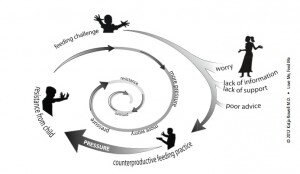Counterproductive Feeding practices: Part III of the Worry Cycle
 Quick recap of the Worry Cycle so far...When families find themselves struggling with feeding it usually begins because the child presents with a feeding challenge (anything from an oral-motor delay to painful reflux, to being larger or smaller than average in our current culture). The worried parent, with little support and often poorly advised by the very experts they turn to for help, then turns to counterproductive feeding practices with the goal of either getting the child to eat more, less, or different foods. Which brings us to the bottom part of the worry cycle of feeding: counterproductive feeding practices.Feeding practices are something doctors, dietitians and feeding therapists need to consider more fully when there are concerns about weight gain, nutrition, or oral-motor issues. (As I mentioned in last week's post, most docs get no training in this whatsoever.) Yes, rule out medical issues, ask about what the child is being served, but do not neglect the feeding relationship. Remember, according to the WHO,“Inappropriate feeding practices are often a greater determinant of inadequate intakes than the availability of foods in the households.” My goal with today's post is to assist you in recognizing if unhelpful feeding practices are contributing to your feeding and weight struggles.We may all be able to recognize that holding a child's head down and forcing food, screaming at a child to eat, or calling her a "Pig" does not help a child grow up to be a competent eater, but there are many ways that a child can be pressured or fed inappropriately.
Quick recap of the Worry Cycle so far...When families find themselves struggling with feeding it usually begins because the child presents with a feeding challenge (anything from an oral-motor delay to painful reflux, to being larger or smaller than average in our current culture). The worried parent, with little support and often poorly advised by the very experts they turn to for help, then turns to counterproductive feeding practices with the goal of either getting the child to eat more, less, or different foods. Which brings us to the bottom part of the worry cycle of feeding: counterproductive feeding practices.Feeding practices are something doctors, dietitians and feeding therapists need to consider more fully when there are concerns about weight gain, nutrition, or oral-motor issues. (As I mentioned in last week's post, most docs get no training in this whatsoever.) Yes, rule out medical issues, ask about what the child is being served, but do not neglect the feeding relationship. Remember, according to the WHO,“Inappropriate feeding practices are often a greater determinant of inadequate intakes than the availability of foods in the households.” My goal with today's post is to assist you in recognizing if unhelpful feeding practices are contributing to your feeding and weight struggles.We may all be able to recognize that holding a child's head down and forcing food, screaming at a child to eat, or calling her a "Pig" does not help a child grow up to be a competent eater, but there are many ways that a child can be pressured or fed inappropriately.
What can pressure look like?
Here are a few tactics I've seen in my work with parents:
- using the TV to get a child to eat more or less
- screaming, crying, begging, forcing
- leaving the child in the highchair for hours a day hoping he will eat a few more bites
- bribing with toys, stickers, money, dessert
- playing games, performing "cirque-du-soleil"-worthy tricks if the child takes a bite
- excessive guilt-tripping or praising
- no-thank you, or two-bite rules*
- following the child around with food or supplement drinks and constantly trying to get the child to eat/drink
- taking a child to Weight Watchers or making comments about weight, calories, anything to get a child to eat less
- focusing on what or how much the child eats (yes, even that can turn some kids off)
- "running out" of red-light foods, putting locks on cupboards and fridge
...I think it is important to acknowledge that pressure seems to work, in the short term, for many parents, which is part of why it is so hard to give it up/climb out of the Worry Cycle. TV may get an extra spoon of rice into your child at that meal, but the pressure or distraction tactics aren't helping your child learn to be a competent eater and most often makes matters worse. A dad might challenge me at a workshop, "The only way my son ever eats anything green is when I bribe with dessert." Helping children eat well is a process we can slow down in countless ways, but isn't really something we can speed up. Children will approach eating skills at their own pace.If you were pressured, or you're stuck with feeding now, are there any tactics I've missed? Anything you want to add to the discussion? For our final installation on the intro to the Worry Cycle next week, I will discuss why many children resist pressure and push back. Why in essence, all the work and pressure is almost guaranteed to backfire, making feeding struggles worse. The good news is, it doesn't have to be so hard.** a teaser for next week's topic from my book, Love Me, Feed Me:Two popular pieces of feeding advice: The “no thank you” and “two-bite” rules result in some of the more serious, frequent, and avoidable battles I see. In the first instance, the parent is told to require that the child take one bite before he is allowed to reject a food, or say, “no, thank you.” The “two-bite rule” means the child is required to eat two bites of everything at the table or on his plate.I often hear variations on this theme, “Our older son is a great eater, and we use the ‘no-thank-you bite’ rule for him. That rule helped him learn to eat with no problems, so we’ve been using it on our younger son, but he’s really picky and we argue over that one bite for most of the meal.” Indeed, the easygoing, eager-to-please, or fearful child may go along with the rules for now, but what happens if you try these methods on the persistent or sensitive child, or the child who is locked with you in a power struggle, or the hurt child who is anxious and desperate for control? These seemingly innocuous rules can result in impressive battles, and are not consistent with the Trust Model. Parents forget that it’s not about one bite—it’s about control.
